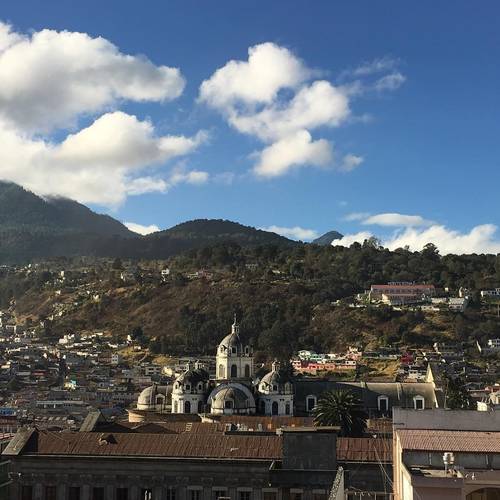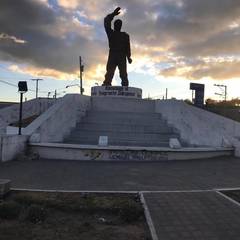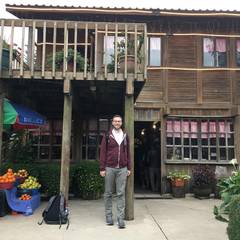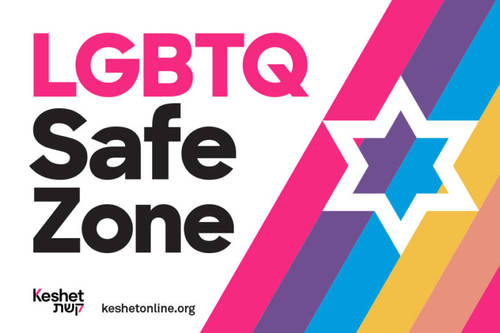Letter from Guatemala
01/17/2019 07:11:04 PM
| Author | |
| Date Added | |
| Automatically create summary | |
| Summary |
 My dear friends,
My dear friends,
While it is my sincere hope that you join me on the evening of Wednesday, February 13 for a full discussion of what I experienced and learned during my time in Guatemala with American Jewish World Service (AJWS), I wanted to provide you with a pre-Shabbat update about my journey.
First, the question: why am I in Guatemala?
I am here as part of AJWS’ Global Justice Fellowship, a selective program designed to inspire, educate and train leading American rabbis to become better advocates for social justice and human rights in the Global South and beyond. I am traveling with 14 extraordinary rabbinic colleagues from all over the country who represent a broad array of backgrounds, communities, experiences and networks, as well as with some incredible AJWS staff and local guides.
But, more basically, to quote Dr. Martin Luther King (whose memory we honor this holiday weekend), I am in Guatemala because injustice is here. As one of my colleagues said yesterday in our meeting with the American Charges d’Affaires in Guatemala, “While each of us may serve a particular congregation in a particular place, the Torah teaches that all of humanity is our constituency.”
Moreover, events at home, abroad, and here in Guatemala — which I will elaborate upon at the February program — remind us, again to borrow a phrase from King, that all communities and states are interrelated, that “injustice anywhere is a threat to justice everywhere.” We thus cannot sit idly by in Richmond and not be concerned about what ens in Guatemala, just as Guatemalans have a stake in what happens in the United States.
 Our journey so far has thus been an opportunity to explore, examine, and understand the current state of human rights and socioeconomic justice in Guatemala. We have been meeting with local people who are impacted by inequality and oppression, as well as with leaders who are working to change the status quo. Additionally, both prior to and during our trip, we have been studying the cultural, economic, and political history of Guatemala and also paying attention to current events here. We have especially focused on the historical and present role the United States plays in the narrative of this country. We have also been digging deep into Jewish texts and traditions around justice, responsibility, and moral courage. The conversations with my thoughtful and insightful colleagues this week have already been transformative for me.
Our journey so far has thus been an opportunity to explore, examine, and understand the current state of human rights and socioeconomic justice in Guatemala. We have been meeting with local people who are impacted by inequality and oppression, as well as with leaders who are working to change the status quo. Additionally, both prior to and during our trip, we have been studying the cultural, economic, and political history of Guatemala and also paying attention to current events here. We have especially focused on the historical and present role the United States plays in the narrative of this country. We have also been digging deep into Jewish texts and traditions around justice, responsibility, and moral courage. The conversations with my thoughtful and insightful colleagues this week have already been transformative for me.
To give you a sense of who we have been meeting so far:
On Monday, we met with an organization called UDEFEGUA, a Spanish acronym for the Union of Human Rights Defenders in Guatemala. In Guatemala, as is true elsewhere in the developing world, those who advocate for human rights and democracy are routinely threatened, harassed, imprisoned, or worse. UDEFEGUA furthers the work and improves the security of human rights defenders in Guatemala and elsewhere in Central America, enabling organizations and individuals who defend human rights to do their critical work.
We then toured Casa de la Memoria, a museum dedicated to the culture and historical experience of Guatemala’s indigenous peoples, whose rich, millennia-old culture has been strained by centuries of conquest, colonization, plunder, exploitation, discrimination, and even genocide. The museum was a perfect prelude to our meeting with BUFETE, an organization dedicated to provide legal aid to communities and individuals that have been victims of human rights violations committed, or condoned, by the state. We heard powerful and moving testimony from BUFETE’s legal team, as well as from some of the individuals communities they are representing, people who have suffered unconscionable injustices at the hands of Guatemala’s government during and since the Internal Armed Conflict here (1960-1996).
Monday’s meetings fell against the backdrop of a major political and human rights drama that is playing out in Guatemala as we speak: the nation’s president, Jimmy Morales, moved recently to terminate the mandate of the UN-backed organization responsible for investigating and prosecuting corruption, CICIG, and expel its head from the country, upon learning that he himself was under investigation for campaign-finance violations. On Monday, we saw thousands of protestors take to the streets demanding the reinstatement of CICIG and Morales’ resignation.
Being in Guatemala while political drama was playing out here and at home made for very interesting conversation at the American Embassy, where we met with U.S. Charges d’Affaires David Hodge on Tuesday. An ally in our cause to advance democracy, human rights, and socioeconomic equality in Guatemala, Hodge urged us to ask our representatives in Washington to invest in broad-based prosperity and safeguard the constitutional order in Guatemala, as well as to push our leaders to end the American government shutdown, which inhibits the embassy from doing its crucial work.
The rest of the day Tuesday was spent traveling west to the department (or state) of Quetzaltenango, where we spent all day Wednesday meeting with CODECOT, an organization of hundreds of mostly indigenous midwives. In a region where the hospital system can only accommodate about 20% of all childbirths, and in a culture where home births are preferred and commonplace (especially among the large native population), CODECOT serves the maternal health needs of tens of thousands of Guatemalan women (particularly among the indigenous population), and seeks to influence public policy and culture to improve access to traditional and Western forms of healthcare for all women.
Today and tomorrow will bring more meetings with more inspiring organizations and human rights leaders — a collective of journalists working to defend and advance free speech in a climate of repression, and an organization that works to encourage political participation among indigenous women — as well as further opportunities to learn about and experience this extraordinary country and to reflect and study with my amazing colleagues and AJWS staff. We will also enjoy a rejuvenating Shabbat together at a beautiful coffee plantation near the old colonial capital of Antigua. I look forward, God-willing, to sharing more about all of that when I return, both at the February program and in other settings.
Sending you all love and blessings from Guatemala for a Shabbat Shalom.
Warm regards,
Rabbi Michael Knopf
Mon, September 15 2025
22 Elul 5785
Upcoming Events
-
Tuesday ,
SepSeptember 23 , 2025Temple offices closed
Tuesday, Sep 23rd (All day)
-
Wednesday ,
SepSeptember 24 , 2025Temple offices closed
Wednesday, Sep 24th (All day)
-
Thursday ,
OctOctober 2 , 2025Temple offices closed
Thursday, Oct 2nd (All day)
-
Tuesday ,
OctOctober 7 , 2025Temple offices closed
Tuesday, Oct 7th (All day)
-
Wednesday ,
OctOctober 8 , 2025Temple offices closed
Wednesday, Oct 8th (All day)
-
Saturday ,
OctOctober 11 , 2025Kiddush Co-Sponsored by Jaime and Keith Weinstein
Shabbat, Oct 11th 12:00p to 1:30p
honering Zaiden's Bar Mitzvah, the Wilensky's and Menke's Wedding Anniversaries -
Sunday ,
OctOctober 12 , 2025Kiddush in the Social Hall sponsored by Jamie & Keith Weinstein
Sunday, Oct 12th 12:00p to 2:00p
-
Wednesday ,
OctOctober 15 , 2025Temple offices closed
Wednesday, Oct 15th (All day)
-
Saturday ,
OctOctober 18 , 2025Kiddush Sponsored by Tori Rodman
Shabbat, Oct 18th 12:30p to 2:00p
-
Saturday ,
NovNovember 15 , 2025Rabbi Rachel Salston
Shabbat, Nov 15th (All day)
Conference
subscribe
Privacy Settings | Privacy Policy | Member Terms
©2025 All rights reserved. Find out more about ShulCloud



